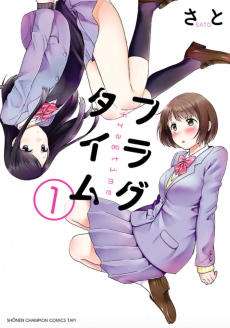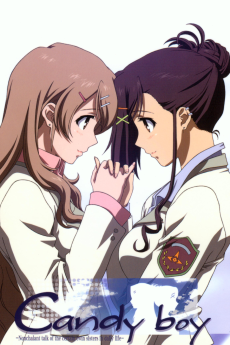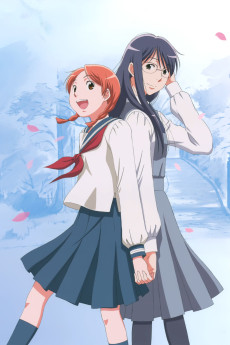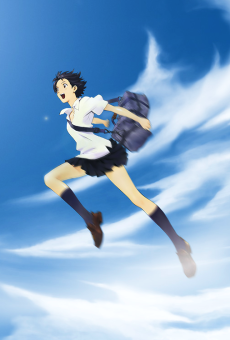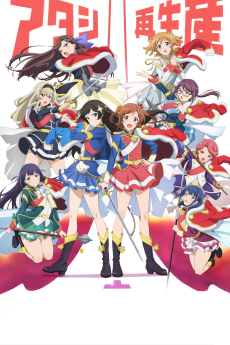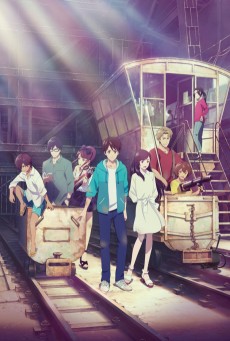FRAGTIME
MOVIE
Dubbed
SOURCE
MANGA
RELEASE
November 22, 2019
LENGTH
60 min
DESCRIPTION
All Misuzu Moritani has to do is think about it and, for three minutes, time seems to halt for everyone but herself. But three minutes isn't long enough to go anywhere and come back, especially when you can only do it once a day. So, mostly Misuzu just amuses herself… until she makes the mistake of sneaking a peek up the skirt of a classmate she's been crushing on and it turns out that Haruka Murakami is somehow immune to Misuzu's powers! Oops. And now a really embarrassed Misuzu has to make it up to Haruka. Double oops. Even if it means getting into a "relationship". Wait, what?
(Source: Sentai Filmworks)
CAST

Haruka Murakami

Yume Miyamoto

Misuzu Moritani

Miku Itou

Yukari Kobayashi
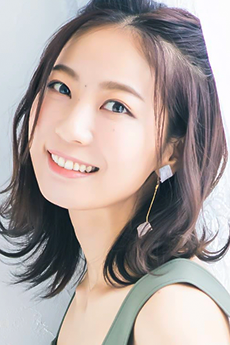
Chika Anzai
RELATED TO FRAGTIME
REVIEWS

makyou
70/100"I have to be like that, or no one will love me" - A review of Fragtime.Continue on AniListA review of Fragtime
spoilers~

The feature film (ova?) Fragtime, adapted from Sato's yuri manga, is memorable for its ambitious thematic thrust, yet falls short of truly achieving a perfect execution—it's notably liberal in its use of narrative shortcuts, resulting in a stunted & dry story. Its strength is in it's premise and ideas, and occasionally in strong moments, but the rest of its runtime is padded with somewhat boring craft, and exposition. And, its plenty heavy on exposition—many of the key moments are essentially explained through voiceover.
The "thematic thrust" I described earlier is quite possibly, the most powerful facet of the Fragtime experience, so I'll cover that first. Fragtime is a romance; the tensions & struggles are created through the interplay between our two mains. These two mains are: Misuzu Moritani, our protagonist, a girl mostly characterized for her loneliness, her seclusion from the rest of high school society—she practically lives in her own world (haha); Our deuteragonist, Haruka Murakami, the love interest, is a girl notable for how social and altruistic she is—she tries to be friends with, and tries to please everyone around her, to a self-destructive extent—using a false performative façade, and ignoring her “true self”. The growth and progression of the characters are as follows: Moritani has to become more social, break her self-contained bubble, and become attuned to the needs of others; while Murakami’s growth is opposite of this—she has to stop being so destructively altruistic, and become a bit selfish with her own personal needs. These internal struggles are symbolized through the time-stop—Moritani uses the time-stop as an escape from difficult situations, and escape from having to deal with others, it’s symbolic of her seclusion; to Murakami, its an escape from having to maintain her façade, she can just be herself. This escapism can’t last forever though, so they have to come to terms with their issues—the conclusion being that the time-stop ability has disappeared, and both girls learn to grow.

Fragtime’s theming is quite excellent in two ways. The first being that the film is quite articulate in this theming; it understands it and expresses it with a sophistication that is quite compelling, and well above average. The second, is Murakami; her self-destructive behavior and façade, while slightly trope-y, hit hard with me—while I don’t think I act in this way, I have friends that do, to a great detriment to their mental health. It’s quite a unique perspective, and it works somewhat well.
I also have issues with the storytelling though. Mostly, it’s just like, “lazy”, y’know. Quite possibly the most prominent criticism for Fragtime is its sub-par characters, and I’m inclined to agree—the characters are mostly flat and underdeveloped. These characters are very non-distinct, and most aspects of their character are derived from common tropes—outside of the simple of character outlines, there aren't many interesting, unique, or even endearing character traits. I praised the theming for being articulate, but its not flawless; it’s very blunt and lacks nuance or subtlety. I’ve been lenient on it, but some might find it too generic, as many aspects of the theme are done better in other places—an example would be Yagate Kimi ni Naru’s Touko—though one could argue Touko's arc is about a different form of performativity, but I digress. The script is also not particularly tight in general—it covers the ground it needs to, but it overuses devices such as exposition, and it’s not particularly engaging. The storytelling itself is feels clunky & unwieldy, and due to the “looseness” of the script, it doesn’t flow well.
I feel a similar way about the script and the artwork; its memorable, but not exceptional. Fragtime’s character designs are of a style that I quite like, very low contrast and no shadows, but sharp linework—yet Fragtime doesn’t do this particularly well, the designs are sharp, expressive, and attractive, but not really dynamic, or animated; in like the way that, for example, Sadamoto Yoshiyuki’s designs in Mamoru Hosoda films are. The backgrounds are fine; they’re forgettable. The overall presentation is, similarly, just fine. The film doesn’t really show a particular talent for the edit, composition, or anything, really.


sharp, low contrast, pretty designs


background artFragtime has some good qualities, yet it isn’t a flawless experience. I enjoyed my time with this film, yet there were plenty of moments where it broke my suspension of disbelief. I liked it; very gay movie.

Danny17
70/100An ambitious film that is so much more than your typical fluffy yuri romanceContinue on AniListThis Review Contains Spoilers
I went into this movie expecting a wholesome yuri romance. Granted, I haven't watched a lot of yuri (even though I've read my fair share of manga), this was the impression that I got when I looked at the poster for the movie. However, it turned out to be so different from what I thought. The premise is about a girl, Moritani, who has the power to stop time, albeit only for three minutes. With her being the wise person that she is, she uses this time to look up the skirt of another girl, Marukami. To her surprise, Marukami can move around while time is stopped. While the premise itself is somewhat interesting, it's really the thematic clarity of the show that warrants high praise from my side, especially because in a lot of the manga that I've read, I've found yuri to be all fluff and no substance. Because of this reason, this review will mostly be me talking about the themes of the movie.
The entire theme of not acting according to what others think and instead expressing your own individuality is honestly nothing new, I've seen it being conveyed very well in a lot of forms of media, including anime. However, I believe that this movie adds a somewhat unique layer of depth to this theme by making the main character, Murakami, someone who acts as a crowd pleaser who refuses to actually get up and personal with other people out of fear of rejection. She feels that, despite everything that she does for everyone, nobody is interested in the real her and blames them for it instead of her own insecurity and fear.
The other main character, Moritani, eventually spots this trait of hers by virtue of a scene in which Murakami invites Moritami to her house and shows her all the information she keeps on all here classmates- their likes, dislikes, etc- and even shows Moritani the information that she has on her. However, when Marukami shows her own information, all she can come up with is that she essentially wishes to be liked by everyone, which is why it makes sense for her to do all the steamy stuff in the classrom with Moritani. Of course, Moritani realizes that the information that Marukami has on her is not accurate: since she doesn't take the effort to show her real self to others, they don't show their real self to her too.
Through this showcase, the movie is able to push this really beautiful theme of...many things really. Conditional love? Mutual understanding? The need for relationships to not be a one way street because that only leads to harm and rejection? Whatever you want to call it.
As a side note, I would also like to praise the movie not making "lesbians" a defining factor (i.e. by adding gay tropes such as a gay awakening, "but she's a girl", etc). The relationship between our two main characters is seen as nothing more than a regular romance, the film does not lay emphasis on both of them being girls.
Honestly the visuals and the OST did leave something to be desired but it was still a really good movie with interesting ideas and pretty good execution so I think that more people should give it a try.

JustJaredHere
70/100A distorted perception on making friends and being loved (Warning: Spoilers)Continue on AniListI saw a reviewer write "If I don't act this way, no one is going to like me" and it encapsulates this anime completely. I went in to this movie with the expectation of a yuri romance with a unique twist of being able to stop time. Instead, I got more of a psychological drama of internal conflicts on what it means to truly express who you are and what you want to be.
We have Moritani, one female lead whom is introverted, scared to communicate with others, and has the power to stop time for 3 minutes. The 2nd lead, Murakami, is the heroine that we learn of the central theme the movie showcases
The lead Murakami essentially tries to be a "good girl" and behave in a way to have her classmates meet many of the expectations they have of her for them, creating this perception that by doing this, she can be well liked and make friends. Moritani, on the other hand, notices this and through the course of the movie tries her best to understand Murakami, her behavior, and what is going on in her thoughts and emotions, but can't really understand her and wants to know why Murakami behaves that way. By finding out that Murakami has did her darndest to learn every facet of hear classmates so she can be well like, even since being a very little girl, Moritani effectively challenges this, showcasing the internal conflict and distorted perception Murakami has to making friends. She truly believes that if she doesn't meet people's expectations, holds herself to be around others, other facets of being in many social circles, then she won't be liked, loved, and be lonely. Moritani challenges this distorted perception, and tells Murakami that she doesn't need to do this, to be open and true to her true individualistic way of expressing herself, and for both Moritani and Murakami to not rely on this power of stopping time to be together. At this very point, a confusing story filled with metaphors gets understood and connected together at this moment.
Fragtime isn't so much a yuri romance, but rather a drama showcasing how a distorted perception can affect your life and you come to believe this distortion, challenge it, and comes to terms to who you really are and how you want to portray yourself. The movie doesn't bring in tropes such as "they're lesbians" or "they're both girls", but rather the yuri romance is just a regular romance with the purpose of highlighting what kind of dynamic they 2 leads have with one another and bringing out the distortions Murakami has, as well as the issues Moritani has.
I'd say that Fragtime is worth the watch, to see how the 2 leads are, their dynamic, and the central theme it conveys.
SIMILAR ANIMES YOU MAY LIKE
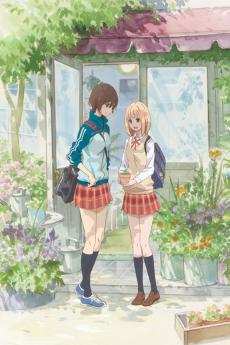 OVA RomanceAsagao to Kase-san.
OVA RomanceAsagao to Kase-san.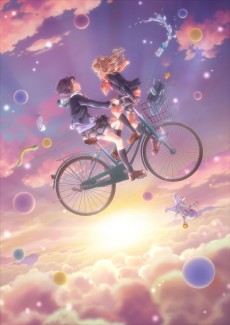 ANIME RomanceAdachi to Shimamura
ANIME RomanceAdachi to Shimamura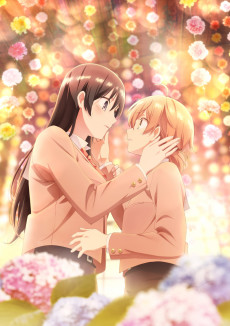 ANIME DramaYagate Kimi ni Naru
ANIME DramaYagate Kimi ni Naru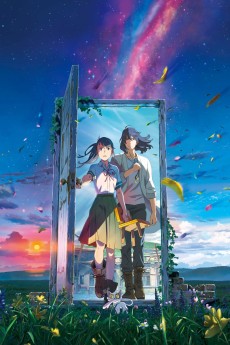 MOVIE AdventureSuzume no Tojimari
MOVIE AdventureSuzume no Tojimari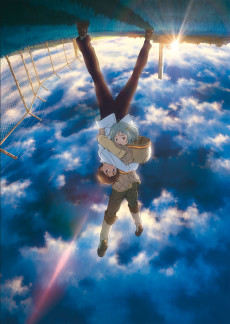 MOVIE AdventureSakasama no Patema
MOVIE AdventureSakasama no Patema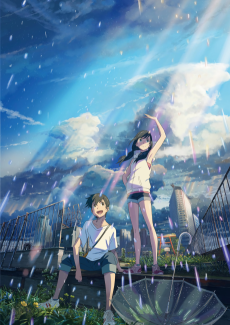 MOVIE DramaTenki no Ko
MOVIE DramaTenki no Ko
SCORE
- (3.2/5)
TRAILER
MORE INFO
Ended inNovember 22, 2019
Main Studio Tear-Studio
Favorited by 187 Users
Hashtag #フラグタイム


